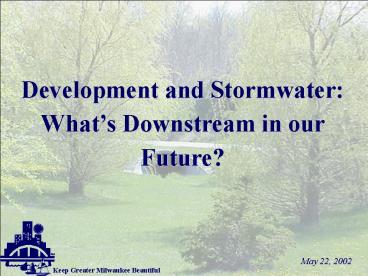Development and Stormwater: PowerPoint PPT Presentation
1 / 26
Title: Development and Stormwater:
1
Development and Stormwater Whats Downstream in
our Future?
May 22, 2002
2
Introductions
- Mike Hahn, P.E., P.H. - SEWRPC
- Karen Sands, AICP - MMSD
- Len Roecker, P.E. R.A. Smith Associates, Inc.
- Jeff Kenkel, P.E. National Survey Engineering
- A Division of R.A. Smith Associates,
Inc.
3
Regulatory Framework for Stormwater Management
- MMSD Chapter 13 Rule
- Surface Water and Storm Water
- Proposed WDNR Chapter NR 151 Rule
- Runoff Management
- WDNR Chapter NR 216 Rule
- Storm Water Discharge Permits
4
MMSD Chapter 13 RuleSurface Water and Storm
Water
- Applicable within MMSD sewer service area
- Primarily addresses water quantity control
- Controls on two- and 100-year storms
- Intended to avoid increases in flood flows and
preserve the integrity of MMSD flood control
projects
5
Proposed WDNR Chapter NR 151 RuleRunoff
Management
- Approved by Natural Resources Board, but not yet
by the Legislature - Addresses water quality through agricultural and
urban performance standards - Requirements for construction sites, new
development, redevelopment, and existing
development
6
WDNR Chapter NR 216 Rule Storm Water Discharge
Permits
- Permit program required under the Federal Clean
Water Act - Administered by WDNR
- Permits required for
- Construction sites
- Certain industries
- Certain municipalities
7
MMSD Chapter 13 Rule Overview
- Purpose
- Genesis
- Rule basics
- Things local governments/developers must do to
comply
8
Purpose of Rules
- Reduce floodings unsafe conditions, property
damage, economic losses, adverse health effects - Maximize flood abatement facilities watercourse
improvements - Reduce number/magnitude of sewage releases
- Promote comprehensive watershed planning
- Restore enhance use enjoyment of watercourses
- Protects MMSDs 300 million investment in
flood management
9
Genesis of the Rules
- Reasons
- Devt significantly increases peak volumes
- Local stormwater rules are not uniformly
effective - Development Team (1 year)
- TAT (28 member communities)
- DNR
- Milwaukee County
- SEWRPC
- MMSD staff
10
Floodwater vs. Stormwater
- Floodwater Water out-of-bank
- Stormwater Water before it reaches a watercourse
11
Flood Management Rule
- Jurisdiction
- Additional jurisdiction
- Flood abatement projects
12
Stormwater Rule Applies Where
- New impervious surfaces ? 0.5 acre
- Ultimate sewer service area
- Development that receives approval on or after
1/1/02
13
Stormwater Rule Doesnt Apply Where
- Riparian land
- Residential infill
- Minimal impervious area (lt 5)
- Development approved before 1/1/02
- Recreational trails
14
Stormwater Rule Requirements
- Manage the volume, timing, peak flow rate of
runoff - Follow order of preference
- Determine the degree of runoff management
necessary
15
Stormwater Rule Order of Preference
- Preserve natural features
- Preserve existing drainage ways
- Minimize new impervious surfaces
- Convey stormwater in open vegetated swales
- Construct quality/quantity structures
- Construct quantity structures
16
Stormwater Rule Analyses
- Watershed analysis
- Individual development analysis
- Runoff rate targets
- Critical time analysis
17
Local Government Impacts
- Site development stormwater management plans w/in
30 days of design decisions - Site development plan requirements are included
in the rule - Annual reporting requirements
18
Additional Requirements
- New stormwater conveyance, upgrades, outfalls
should prevent - Reduction in flood level of protection
- Increase in the regional flood
- New guidance effective 7/1/02
19
Stormwater Rule
- Want to know more?
- 2 volume guidance manual
- http//www.mmsd.com/
20
Municipal Government PerspectiveNR 216 Permits
- Communities to identify pollutant sources (public
and private) - Requires comprehensive stormwater management plan
- Reduce pollutants 40 by 2003
- Many will need outside expertise to complete plan
- May result in large capital expenditures
- Public education component
- Development of dedicated revenue sources to fund
projects in plan
21
Municipal Government PerspectiveNR 151 Rule and
MMSD Chptr 13
- Review local ordinances for peak flow and runoff
management - Provides more oversight of new development and
re-development projects - May result in increased staff commitment to
administer - Proposed infiltration standard may reduce amount
of stormwater leaving sites - May also reduce need for structural detention
facilities - Promotes greater green space ratios
22
Developers PerspectiveUnderstand Stormwater
Management (SWM)
- Understand concept need
- Many developments already consider SWM
- Residential
- Retail
- Mostly Ponds and Swales
23
Developers PerspectiveMake it an Asset
- Aesthetic Ponds
- Wetland Storage
- Different rules dictate size
- Different size dictates appearance
24
Developers PerspectiveTime Money
- Money
- Consumes valuable land
- Loss of saleable land means loss of revenue/ROI
- Increase land sale prices?
- Urban vs. rural development
- Big box vs. industrial parks vs. residential subs
- Redevelopment examples
25
Developers PerspectiveTime Money
- Time
- Numerous agencies regulating stormwater
- Overlapping regulations
- Governing authority
- MMSD, Local, DNR, DOC
- Sequential or simultaneous reviews?
- Hybrid ordinances
26
SummaryCan Government Help?
- TIFs already under fire for helping developers
- Understanding is key
- Without help, stormwater management regulations
could possibly encourage sprawl and deter
redevelopment, which is no ones objective. - Rural / residential at one extreme
- Urban / retail development at the other extreme
- Many shades in between

